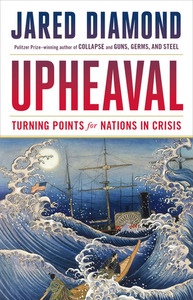Take a photo of a barcode or cover
Very light fare. The premise is to look at patterns of crisis in a range of nations to see what factors helped them adapt so as to find what leads to success. However, coverage of the nations in question is pretty superficial for anything like an academic study. I thought his past work, Guns, Germs, and Steel, was light on rigor, but this is even less so. It does give a nice overview of the state of the various nations and their points of crisis. Good if you don't want to get bogged down in details. But I didn't come away feeling like the point made it much past an interesting theory.
challenging
informative
reflective
medium-paced
Interesting argument but quite repetitive
Also a fair amount of casual racism and sexism
Also a fair amount of casual racism and sexism
I read Guns, Germs, and Steel as a teenager, and it had a profound effect on my worldview, so I was excited to read Jared Diamond's newest book. Unfortunately, I was deeply disappointed. Its biggest fault: it's boring. It rambles. Several pages at the end of every chapter are devoted to recapping what we just read. The writing style is very dry, and Diamond's reliance on presenting his friends' opinions as facts is a more amateur tactic than I would expect from him ( "my Chilean friends say..." "my Japanese friends and family member say..." "my venture capitalist friends say..."). At one point, when discussing contemporary issues facing the US, Diamond acknowledges there are racial issues and women's issues, but then declares he's not going to get in to those. Lol, ok rich old white man.
He lost me for good when he stated the US's power is a result of "advantages of geography, politics, economics, and society," not even attempting to acknowledge the bloodbath that put the US in this position. There's no mention of the genocide and widespread stealing of land from its Native peoples (although he does mention this in Australia's history), nor the slave labour on whose backs settlers achieved economic prosperity. In fact, the only time Diamond mentions the Native populations who were slaughtered and displaced during his chapter about American advantages, is to blithely mention that Native peoples were immigrants too! (13 000 years ago.) Perhaps Diamond needs to make some Black and Native American friends.
He lost me for good when he stated the US's power is a result of "advantages of geography, politics, economics, and society," not even attempting to acknowledge the bloodbath that put the US in this position. There's no mention of the genocide and widespread stealing of land from its Native peoples (although he does mention this in Australia's history), nor the slave labour on whose backs settlers achieved economic prosperity. In fact, the only time Diamond mentions the Native populations who were slaughtered and displaced during his chapter about American advantages, is to blithely mention that Native peoples were immigrants too! (13 000 years ago.) Perhaps Diamond needs to make some Black and Native American friends.
Quite repetitive at some points, and peppered with anecdotes and unscientific, personal conjectures, and Diamond's framework to think about crises and crisis response isn't amazingly groundbreaking.
But despite all these, still quite an enjoyable and informative read, especially for the bits covering particular historical episodes of selected nations.
But despite all these, still quite an enjoyable and informative read, especially for the bits covering particular historical episodes of selected nations.
Not as interesting as his previous writing, but still a very good read.
dark
informative
tense
slow-paced
The title sums up the book very well. It gives an in-depth analysis of how six different nations - Finland, Japan, Chile, Indonesia, Germany and Australia have coped with sudden and/or gradual changes. There is also an in depth look at the United States, a country in crisis now because of polarized politics, gerrymandering and inequality.
The author starts with looking back at his own personal crises and also setting up a framework for national crises in a personal crises setting.
"Factors related to the outcomes of personal crises:
1. Acknowledgment that one is in crisis.
2. Acceptance of one's personal responsibility to do something.
3. Building a fence, to delineate one's individual problems needing to be solved.
4. Getting material and emotional help from other individuals and groups.
5. Using other individuals as models of how to solve problems.
6. Ego strength
7. Honest self-appraisal
8. Experience of previous personal crises
9. Patience
10. Flexible personality
11. Individual core values
12. Freedom from personal constraints"
I found this a useful framework, both in terms of nations - and in terms of my own experience. The differences in how Germany and Japan have handled their World War II crimes is astonishing. All German school children are taught this. German state leaders after WW II have begged for forgiveness on their knees. Japanese school children have no insight into what their forebears were responsible for. China and Korea are still hostile toward Japan because of the inability of the latter to properly apologize.
After the national crises have been dealt with, Jared Diamond takes a look at the crisis facing all of us today: depletion of natural resources and climate change. If we do not take a common cause, we are headed for trouble really fast. Particularly since political non-compromise is on the rise. It started in the United States, but what is happening there is likely to spread. The world is becoming a more hostile and unfriendlier place, at the same time that the need to gather around a common cause to save our planet from destruction is becoming all the more acute. Much can be learned from history, should we only care to look.
The author starts with looking back at his own personal crises and also setting up a framework for national crises in a personal crises setting.
"Factors related to the outcomes of personal crises:
1. Acknowledgment that one is in crisis.
2. Acceptance of one's personal responsibility to do something.
3. Building a fence, to delineate one's individual problems needing to be solved.
4. Getting material and emotional help from other individuals and groups.
5. Using other individuals as models of how to solve problems.
6. Ego strength
7. Honest self-appraisal
8. Experience of previous personal crises
9. Patience
10. Flexible personality
11. Individual core values
12. Freedom from personal constraints"
I found this a useful framework, both in terms of nations - and in terms of my own experience. The differences in how Germany and Japan have handled their World War II crimes is astonishing. All German school children are taught this. German state leaders after WW II have begged for forgiveness on their knees. Japanese school children have no insight into what their forebears were responsible for. China and Korea are still hostile toward Japan because of the inability of the latter to properly apologize.
After the national crises have been dealt with, Jared Diamond takes a look at the crisis facing all of us today: depletion of natural resources and climate change. If we do not take a common cause, we are headed for trouble really fast. Particularly since political non-compromise is on the rise. It started in the United States, but what is happening there is likely to spread. The world is becoming a more hostile and unfriendlier place, at the same time that the need to gather around a common cause to save our planet from destruction is becoming all the more acute. Much can be learned from history, should we only care to look.
challenging
dark
informative
reflective
slow-paced
I read a third of the book, and while there was no tangible "theory" or idea behind the gathered and trimmed facts, it still gave tidbits of information. But then came the chapter on Chile, and I couldn't bear the crap.




